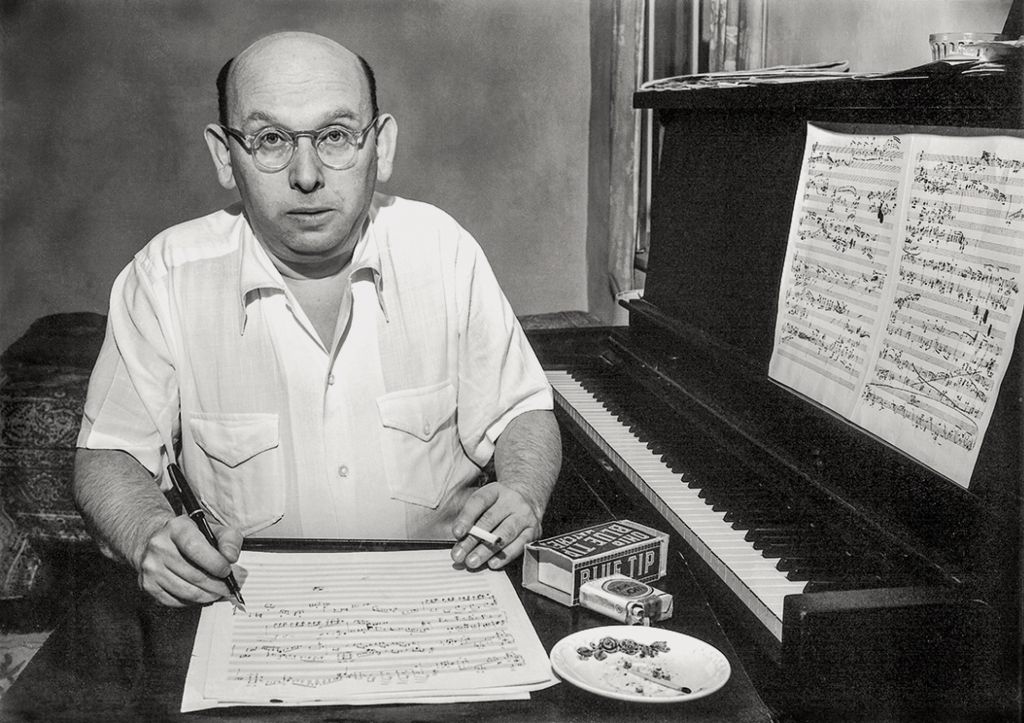On 4 and 5 December 2023, the mdw once again did justice to its reputation as a centre of research on Hanns Eisler. The predecessor to today’s Department of Musical Acoustics had already held two Eisler symposia in 2003 and 2009 as well as presented the volume Hanns Eisler – Ein Komponist ohne Heimat? [… – A Composer Without a Home?]. These efforts were followed in 2018 by the symposium Zwischen Welten – Hanns Eisler und die Umbruchjahre 1918–38–49–68 [Between Worlds – Hanns Eisler and the Sea Changes of 1918–38–49–68] at the mdw’s Department of Musicology and Performance Studies. The same department went on this past December to host the Viennese edition of the “EislerTage 2023” in cooperation with the International Hanns Eisler Society, the Hanns and Steffy Eisler Foundation in Berlin, the Georg and Alice Eisler Fund for Visual Artists and Composers in Vienna, the Cultural Affairs Department of the City of Vienna, and the museums of the Viennese districts of Landstraße and Wieden.

This symposium’s title of “Three ‘Nonconformists’” also referred to the composer’s son, painter Georg Eisler (1928–1988), as well as to Erwin Ratz (1898–1973), a fellow Schönberg pupil and mdw professor who taught theory of form. Exhibitions were devoted to both of these figures, a programme of music by Eisler presented by Ensemble Kontrapunkte witnessed the inauguration of the Georg and Alice Eisler Award for Composers, and the First Women’s Chamber Orchestra of Austria took the stage together with Winnie Böwe (voice) and Christoph Keller (piano) to perform works by Hanns Eisler, Gustav Mahler, Karl Heinz Füssl, and Wilhelm Zobl in the mdw’s Fanny-Hensel-Saal. The central event of the EislerTage was the symposium itself, introduced by mdw Rector Ulrike Sych and opened by Executive City Councillor for Cultural Affairs and Science Veronika Kaup-Hasler, which enriched the general state of knowledge regarding the life and works of these three “nonconformists” by a copious array of new insights.
Stefan Schmidl highlighted numerous aspects of Eisler’s music composed for Viennese film productions during the 1950s, while Hannes Heher’s study of the largely unknown Viennese archive of the International Society for Contemporary Music (ISCM) shed light on Eisler’s brief presence there as well as on the long-running activities of Erwin Ratz. Philipp Maurer, who volunteers as director of the district museum of Wieden, applied his Wieden-related knowledge to full effect concerning Hanns Eisler and Wieden’s Neues Theater in der Scala, and Hartmut Krones revealed a number of new data points as well as insights into Eisler’s anxieties and fears during his early East Berlin years gleaned from examination of the correspondence between Lou Eisler and Hilde Glück. Viola Großbach provided intriguing glimpses into the collaboration between Eisler and Bertolt Brecht in the context of Eisler’s cantata Bilder aus der Kriegsfibel. And finally, Peter Konopatsch documented the extremely intense musical collaboration between Eisler and Ratz in light of extant scores.
The visual output of painter Georg Eisler was introduced by Alice Hundsdorfer-Zhou, who placed special emphasis on the thematic areas of anxiety, war, and poverty. Marjana Uhde spoke about Georg Eisler’s work diaries, conveying a precise impression of his creative process and international encounters. Hartmut Krones conversed with three of the painter’s close acquaintances: Franz Hofbauer, who knew the artist since childhood and owns a great number of paintings by him; Manfred Wagner, who curated exhibitions together with Eisler as part of an ultimately unsuccessful effort to have him appointed to a professorship in art education; and Philipp Maurer, who worked together intensively with Eisler in connection with a 1992 exhibition at Vienna’s kleine galerie. Erwin Ratz was given an initial introduction by Antonia Teibler, who has spent many years studying the materials to be found in his estate and was able to present numerous new finds relevant to his biography and activities. mdw Archive head Severin Matiasovits then spoke about Erwin Ratz and the Academy/Hochschule of Music and Performing Arts in Vienna and touched upon the “headwinds” that the Schönberg student encountered here.
Renate Stark-Voit shone a spotlight on Ratz’s services to the International Gustav Mahler Society, which he founded, and on his contributions to the complete critical edition of Mahler’s works. Hartmut Krones then spoke about Erwin Ratz as a member of Schönberg’s circle: Ratz engaged in written correspondence with his teacher Schönberg until shortly before the latter’s death, and he also exchanged letters with important figures including Egon Wellesz, Josef Trauneck, Hilda Steuermann, Rudolf Kolisch, and Max Deutsch. A round table discussion moderated by Christian Glanz, who teaches at the Department of Musicology and Performance Studies and heads the mdw’s Center for Research on Gustav Mahler and Viennese Modernism, served to conclude the symposium. Statements by Zubin Mehta, Alfred Brendel, Gösta Neuwirth, HK Gruber, and Klaus-Peter Sattler were presented in recorded form or read aloud, while Friedrich C. Heller, René Staar, and Johannes Kretz (a grandnephew of Ratz) spoke in person and provided a lively impression of the personality of this “nonconformist” in all his likeability paired with unwavering commitment to his musical and humanist values.

